Social workers were her ‘saving grace.’ Now, she’s going to be one.
“If you ever think that you cannot be accepted at UC Berkeley, do the footwork, trust the process and turn it over," said Tina McClain, who will be graduating with a bachelor's degree in social welfare. "You’ll be amazed at what can happen.”
May 12, 2022

Tina McClain is graduating on May 14 with a bachelor’s degree in social welfare. “I’m filled with unbelievable gratitude,” she said. “If you ever think that you cannot be accepted at UC Berkeley, do the footwork, trust the process and turn it over. You’ll be amazed at what can happen.” (UC Berkeley photo by Sofia Liashcheva)
Tina McClain first found herself on UC Berkeley’s campus when she was 9. She was with her best friend, Jodi, and Jodi’s mom, and they were walking around Berkeley, looking at jewelry on Shattuck Avenue.
“And at the end of our walk, there was UC Berkeley,” said McClain. “As I stood under Sather Gate, I was like, ‘This is my dream. I want to go to college here.’”
As she grew up, McClain began to struggle with depression and ended up in continuation high school. When recruiters from Berkeley presented at a school assembly, they said that students who didn’t have a 4.0 GPA wouldn’t get into Berkeley. So, McClain decided it wasn’t for her. “I put Cal way on the back burner as something unattainable,” she said.
But now, at age 54, McClain has made her dream come true: She will be joining more than 6,000 graduating seniors at Berkeley on Saturday, May 14, as they make their joyous walk across the California Memorial Stadium stage. She will receive a bachelor’s degree in social welfare.
“I’m filled with unbelievable gratitude,” said McClain, with tears in her eyes. “If you ever think that you cannot be accepted at UC Berkeley, do the footwork, trust the process and turn it over. You’ll be amazed at what can happen.”
‘My voice was taken away’
McClain grew up in Union City in the San Francisco Bay Area. Her parents got divorced when she was young, so McClain split her time between her parents, visiting her dad in Fresno during holidays and summer vacation, and living in the Bay Area with her mom the rest of the time.
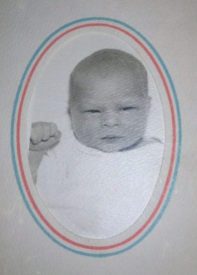
McClain was born in 1968 and grew up in the Bay Area. “My fist was already in the air,” she said of the baby photo. “I was born to advocate.” (Photo courtesy of Tina McClain)
She loved playing with Barbies and doing art projects. On the playground, she would daydream that she was a woman in the circus, twirling from her hair, doing acrobatics high above everyone in the audience, powerful and untouchable.
But in reality, she was quiet and shy, afraid to speak up and voice her opinion — the effects of sexual abuse she experienced at age 3. “I was overwhelmed with fear during that period,” she said. “My voice was taken away.”
Her mom, Geraldine, loved to dance and help others. She was diagnosed with bipolar disorder when she was pregnant with McClain, and couldn’t work a traditional job. Instead, she took on the role of the neighborhood mom and social worker and would often take neighbor kids on day trips to the Santa Cruz Beach Boardwalk.
McClain’s dad, John, was artistic and good with his hands. He was a pastor at a church, and when McClain was in her early teens she would work with him, fixing up donated hotels to become Christian centers, where people who were unhoused and recovering from substance abuse could find refuge.
“I learned from my parents to be that person — to help others, to make things better,” said McClain. “I learned that if there’s a need, to take care of that need.”
Her mom and dad were both Native American and caucasian — her mom, Cherokee and Chickasaw, and her dad, Cherokee, from the Wolf Clan of Oklahoma. McClain was proud to be Native, but often felt ashamed of her whiteness because of the violence it represented in the Native community.
McClain would go on to have three children of her own — Leahneidas, Timothy and Krystal — whom she adores. But the demons of her past trauma still haunted her, and she struggled with substance use and eventually had her children placed with members of her family in foster care while she was in and out of treatment centers.
“When you take away the substance,” said McClain, “you have to deal with the mental health piece and the trauma that has been keeping you in that space.”
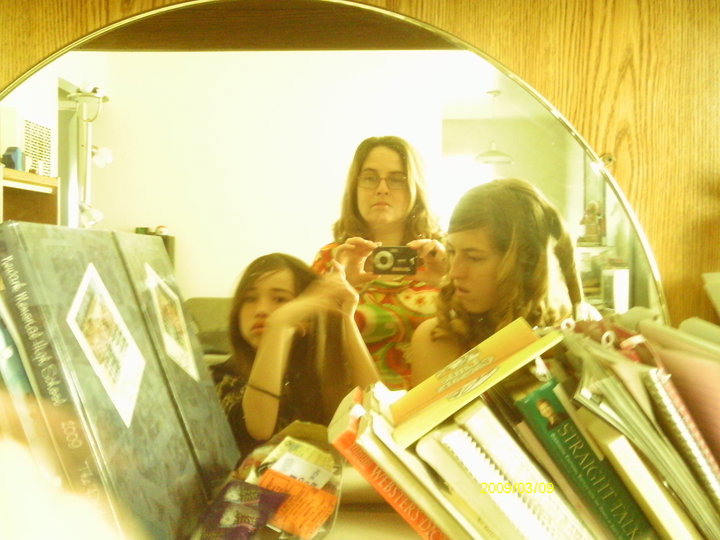
McClain with her two daughters, Krystal (left) and Leahneidas, shortly after they reunified. (Photo courtesy of Tina McClain)
When McClain was first going through the Child Welfare System, she wasn’t sure she could make it through the process. “I felt so alone,” she said. But after three years, with the support of a team of dedicated social workers — child welfare workers, along with family reunification, preservation and maintenance workers — McClain was able to recover and reunify with her children.
“My social workers supported me every step of the way,” said McClain. “They connected me with mental health resources and set me up with housing. They were my saving grace. They saw me as a person and asked me what I needed.”
They even encouraged her to pursue college. “My case manager said, ‘You’re a resource queen. You need to go to school to do what I do.’ And I was like, ‘Maybe so.’”
In recovery and with her kids back at home, McClain felt her world open up. She enrolled in community college classes, first at Ohlone College in Fremont and later in Merritt College’s Community Social Services / Substance Abuse program in Oakland.

McClain, pictured with her three children, Leahneidas, Krystal and Timothy, graduated from Merritt College in 2017 with an associate degree in Community Social Services / Substance Abuse. (Photo courtesy of Tina McClain)
While she went to school, she became a parent advocate with Alameda County Social Services and United Advocates for Children and Families, specializing in the Indian Child Welfare Act. As a parent advocate, she helped families navigate the child welfare system, whether it was helping them with the court process, or showing them how to accomplish everyday tasks, like riding public transportation, cooking dinner or buying eyeglasses. She also served with the Bay Area Collaborative of American Indian Resources, where she supported Native families involved with the child welfare system.
“It’s always about the children, the individual and the family — no matter what,” she said.
In 2018, she cried “tears of joy” when she was accepted as a transfer student to Berkeley, where she would accomplish a lifelong dream on her own terms — but not without a struggle.
Finding, building community at Berkeley
During her first semester at Berkeley, it wasn’t easy for McClain. She knew she was committed to earning a degree in social welfare, but the school was big, and her Native community small, and there was a lot she didn’t know.
In one of her first courses, Social Work as a Profession, a survey class taught by Wendy Wiegmann, McClain got a C-. “I thought I was going to get kicked out of UC Berkeley,” said McClain. “I didn’t realize our GPAs were cumulative.”
Even though getting a C- was a shock, McClain still felt supported throughout the class. She and Wiegmann had been in conversation over the semester, discussing McClain’s struggles and why she was having a difficult time articulating her thoughts.
“She just approaches people,” said Wiegmann, project director of the California Child Welfare Indicators Project. “She’ll look you straight in the eye and will just be herself. And that calls on people to be themselves. I think that’s why she and I were able to connect: She’s not hiding or promoting herself. She’s just being like, ‘I’m Tina, and here’s what’s going on in my life.’”
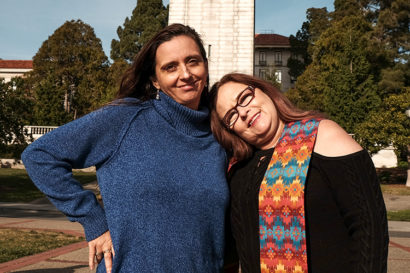
McClain (right) with Darcey Clark, a junior in Berkeley’s Department of Social Welfare. “Tina is my safe haven,” said Clark, who met McClain when they were students at Merritt College. “When I am in danger or in doubt, I can call her. Tina has stuck with me for almost a decade. She changes lives daily.” (UC Berkeley photo by Sofia Liashcheva)
Over the next few semesters, McClain started connecting to resources and feeling more confident on campus.
She reached out to Native American Student Development and the Indigenous and Native Coalition-Recruitment and Retention Center, communities that have been instrumental in helping McClain find her sense of belonging at Berkeley. This year, she began working as a transfer director for the Indigenous and Native Coalition within the bridges Multicultural Resource Center, a coalition of seven recruitment and retention centers that strives to recruit and retain first generation, low-income and underrepresented students of color.
“I’ve seen her passion for her community,” said Millie Hernandez, program coordinator at bridges. “She exemplifies what it means to make time for what you love, for what you want, and she doesn’t let past experiences define what she can and cannot do. She really puts the students first.”
Last weekend, McClain hosted eight Native and Indigenous students on campus as part of Transfer Weekend — a free overnight event where a selection of about 200 admitted transfer students from across California were invited through bridges to learn about the student experience at Berkeley as a student of color.
“These folks deserve to have a higher education experience and to be shown that they belong,” said Hernandez, who attended bridges’ Senior Weekend as an admitted first-year student in 2017. “But it’s a lot. We’re asking students to leave their communities and to join this small one that we’ve created as students and sometimes one that the university fails to foster.”
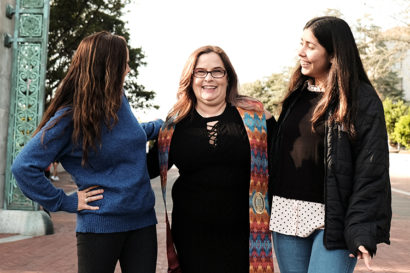
Millie Hernandez (right) is a program coordinator at bridges Multicultural Resource Center. This year, she worked with McClain, who served as the transfer director for the Indigenous and Native Coalition at bridges. “I’ve seen her passion for her community,” said Hernandez of McClain. (UC Berkeley photo by Sofia Liashcheva)
McClain attended Transfer Weekend when she was first admitted to Berkeley four years ago, so she understood the labor and responsibility behind planning an event like that. She said she put all her effort into ensuring students felt valued, seen and, most importantly, like they belonged at Berkeley.
“Throughout my life, I have felt like my whiteness defined and marginalized me in the Native community,” said McClain. “When I came to bridges’ Transfer Weekend, I found other Native people who looked like me and accepted me for me, with my mixed identities. I wanted to show these admitted students that they belong in academia, that they can find community at Cal.”
This year during Transfer Weekend, Indigenous and Native admitted students attended a panel that included the American Indian Graduate Program’s executive director, Patrick Naranjo, and Diversity and Community Fellow Morino Baca. The group also toured the Native American Theme Program and engaged in a talking circle with some of the program’s Native students and alumni, as well as others from the Native community at Berkeley, including Phenocia Bauerle, director of Native American Student Development, and Adina Lewis, a student intern with the Multicultural Community Center.
“The students have now connected and shared stories with the elders in our community and have a community before they arrive at Cal in the fall,” said McClain. “I am blessed to have been given this opportunity to share what was given to me.”
Last week, McClain received a 2022 Chancellor’s Award for Public Service and Civic Engagement for her work on behalf of marginalized communities on campus and in the Bay Area. It’s an honor that she didn’t think she would get, that she didn’t think was possible — until she did, and it was.
An advocate for herself — and others
This weekend and next week, McClain will celebrate her graduation in three ceremonies: first, with all graduating seniors on Saturday; then, at Native American Graduation on Sunday, where she’ll receive a blanket recognizing her accomplishments at Berkeley and her contributions to the Native community on campus; and finally, with her social welfare colleagues on Tuesday, where she’ll be one of the speakers.
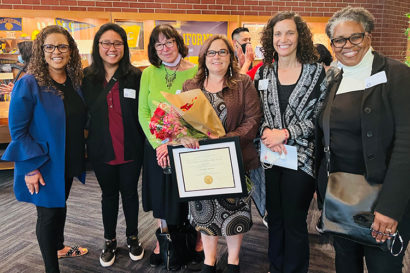
McClain’s advocates, mentors, advisers and colleagues from throughout her life were in the audience as she received the 2022 Chancellor’s Award for Public Service and Civic Engagement. From left: Vanessa Russel, founder and director of Love Never Fails; Cassanda Castillo, an undergraduate adviser of Berkeley Social Welfare; Mary Trimble Norris, director of American Indian Child Resource Center; McClain with her award; Nicole Garay, a social worker at Casey Family Programs; Masani Mawusi Nassor-Covington, a child welfare worker for Alameda County. (Photo courtesy of Tina McClain)
“I am truly grateful that I was given the chance to further my education,” said McClain. “I will be bringing my ancestors with me. I know they would be proud of the woman I have become.”
When McClain receives her diploma, she said, she won’t just be graduating for herself as she is now — an experienced advocate for individuals, children and their families. She’ll be graduating for the shy 9-year-old who stood under Sather Gate with a wish of going to Berkeley, for the 16-year-old who believed Berkeley wasn’t a place open to her and for the young adult who fought every day to get clean and to be reunified with her children.
Next year, McClain hopes to start the Master of Social Welfare Program at UC Berkeley, where she’d like to continue her journey, helping people find their voices in a profession that she’ll always be passionate about.
“That shy little girl who couldn’t say anything or ask for help is now advocating for herself and others,” she said.
In the meantime, she’ll continue working in the field that she loves — one that has given her life a deeper purpose.
In her current role as a substance use disorder counselor for Mujeres Con Esperanza (Women With Hope), a program in La Familia Counseling Center in Sacramento, McClain shares with her clients stories about her experiences, hoping her stories will show them that changing their lives is possible.
“I plant seeds, and it’s up to them to water the seeds,” said McClain. “And then you see them start to grow. Then they come back years later, and they’re like, ‘Hey, you helped me get my kid back.’ I have walked the journey with these folks. It’s empowering, but I have to remain humble.”
In the future, McClain would like buy a duplex, in which she’d live on one side and convert the other to a sober living space for people in recovery, where they could learn financial literacy, maintain their sobriety and save money to become homeowners one day.
But no matter what happens, she said, she’ll always find a way to help families, embodying the compassion she felt from her social workers, yet always aiming higher, giving them the extra support she wished she’d had in her recovery journey.
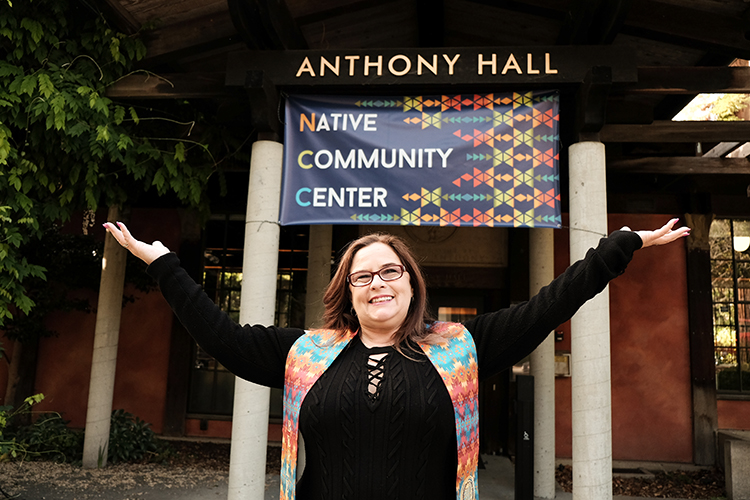
Next year, McClain hopes to start the Master of Social Welfare Program at UC Berkeley, where she’d like to continue her journey, helping people find their voices in a profession that she’ll always be passionate about. “That shy little girl who couldn’t say anything or ask for help is now advocating for herself and others,” she said. (UC Berkeley photo by Sofia Liashcheva)